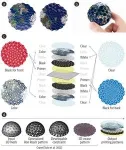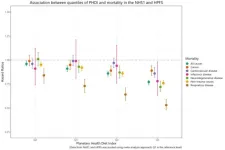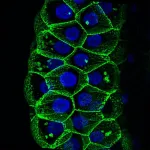(Press-News.org) A diet originally designed to help ward off cognitive decline in adults might also help improve attention in pre-adolescents, according to a new study. The findings could help inform future dietary interventions aimed at improving cognition in children.
The new study examined two diets: the Healthy Eating Index – 2015 (HEI-2015), which is based on the Dietary Guidelines for Americans, and the Mediterranean-DASH Intervention for Neurodegenerative Delay (MIND) diet, which combines the Mediterranean diet with the heart-healthy Dietary Approaches to Stop Hypertension (DASH) diet to create a dietary pattern that focuses on brain health.
“We assessed how adherence to these diets was associated with children’s attentional inhibition — the ability to resist distracting stimuli — and found that only the MIND diet was positively linked with children’s performance on a task assessing attentional inhibition,” said Shelby Keye, PhD, who performed the work as a doctoral student in the Department of Kinesiology and Community Health at the University of Illinois Urbana-Champaign and will be an assistant professor there this fall. “This suggests that the MIND diet could have the potential to improve children’s cognitive development, which is important for success in school.”
Keye will present the findings at NUTRITION 2023, the annual flagship meeting of the American Society for Nutrition held July 22-25 in Boston.
Much like the DASH and Mediterranean diets on which it is based, the MIND diet emphasizes fresh fruit, vegetables, and legumes like beans, lentils, and peas. However, it also includes recommendations for specific foods, such as leafy greens and berries, which promote brain health. Although the MIND diet has been shown to have positive effects in adults, very few studies have been performed in children.
The new research used data collected in a previous cross-sectional study led by Naiman Khan, PhD, a professor of Kinesiology and Community Health at the University of Illinois Urbana-Champaign. The study’s 85 participants ranged in age from 7 to 11 years old and completed a seven-day diet record from which the researchers calculated HEI-2015 and MIND diet scores. To assess attentional inhibition, participants also completed a task that requires spatial attention and executive control with their reaction time and accuracy recorded. Children with neurological disorders such as ADHD or autism were excluded from the study to reduce confounding factors.
The researchers found that MIND diet scores but not HEI-2015 scores were positively related to study participants’ accuracy on the task, meaning that study participants who better adhered to the MIND diet performed better on the task. The researchers caution that although the study shows an association, an intervention study would be necessary to make any causal inferences.
Next, the researchers would like to study the relationship between the MIND diet and attention in younger children, including preschool age and toddlers, to determine if there are any differences based on age and whether a developmental effect is involved.
Keye will present this research at 11:45 a.m. on Sunday, July 23, during the Dietary Patterns Poster Session in the Hynes Convention Center Hall C (abstract; presentation details).
Please note that abstracts presented at NUTRITION 2023 were evaluated and selected by a committee of experts but have not generally undergone the same peer review process required for publication in a scientific journal. As such, the findings presented should be considered preliminary until a peer-reviewed publication is available.
Images available.
About NUTRITION 2023
NUTRITION 2023 is the flagship meeting of the American Society for Nutrition and the premier educational event for nutritional professionals around the globe. NUTRITION brings together lab scientists, practicing clinicians, population health researchers, and community intervention investigators to identify solutions to today’s greatest nutrition challenges. Our audience also includes rising leaders in the field – undergraduate, graduate, and medical students. NUTRITION 2023 will be held July 22-25, 2023 in Boston. https://nutrition.org/N23 #Nutrition2023
About the American Society for Nutrition (ASN)
ASN is the preeminent professional organization for nutrition scientists and clinicians around the world. Founded in 1928, the society brings together the top nutrition researchers, medical practitioners, policy makers and industry leaders to advance our knowledge and application of nutrition. ASN publishes four peer-reviewed journals and provides education and professional development opportunities to advance nutrition research, practice, and education. Since 2018, the American Society of Nutrition has presented NUTRITION, the leading global annual meeting for nutrition professionals.
Find more news briefs and tipsheets at: https://www.eurekalert.org/newsroom/nutrition2023.
###
END
Eating more planet-friendly foods could help you live a longer, healthier life, according to new research. Researchers found that people who followed a more environmentally sustainable diet were 25% less likely to die during a follow-up period of over 30 years compared to those with a less sustainable diet.
The study builds upon prior research that identified foods that are a win-win for both health and the environment—such as whole grains, fruit, non-starchy vegetables, nuts, and unsaturated oils—as well as foods that could be harmful to the environment and human health, like eggs ...
A study of over 10,000 children in rural Pennsylvania revealed that a large proportion of children were fed foods that are high in sugar and salt in their first years of life.
Over half (53%) of the children in the study received high-sodium meats such as hot dogs, 37% received salty snacks such as potato chips, and one-third (34%) received cakes, cookies, or pudding before age 2. In addition, over one-quarter (27%) of babies received juice before their first birthday.
“Given ...
Systematic review of 8 studies in more than 7,700 serodiscordant couples in 25 countries finds people living with HIV with viral loads less than 1,000 copies/mL have almost zero risk of transmitting the virus to their sexual partners. Previous studies have not been able to confirm a lack of transmission risk above 200 copies/mL.
Systematic review also consolidates and reinforces previous studies that have found there is zero risk of transmitting the virus to sexual partners when people living with HIV have an undetectable viral load.
Of the more than 320 documented sexual HIV transmissions ...
In one of the first large-scale studies of genes related to diet, researchers have uncovered almost 500 genes that appear to directly influence the foods we eat. The findings represent an important step toward using a person’s genetics to develop precision nutrition strategies that help improve health or prevent disease.
“Some genes we identified are related to sensory pathways — including those for taste, smell, and texture — and may also increase the reward response in the brain,” said research team leader Joanne Cole, PhD, assistant professor in the Department ...
There is growing evidence that consuming prebiotics — certain types of fiber often found in plants that stimulate beneficial bacteria in your gut — can help to maintain a healthy gut microbiome. In a new study, scientists estimated the prebiotic content of thousands of food types by using preexisting literature to find out which foods offer the highest prebiotic content.
According to the study, foods that pack the greatest prebiotic punch are dandelion greens, Jerusalem artichokes, garlic, leeks, and onions. In addition to supporting gut microbes, prebiotic rich ...
A University of Texas at Arlington engineering researcher is working on defenses that could thwart cyberattacks against networks of self-driving cars and unmanned aerial vehicles.
Animesh Chakravarthy, associate professor in the Department of Mechanical and Aerospace Engineering (MAE), is the principal investigator on an approximately $800,000 U.S. Department of Defense grant titled “Resilient Multi-Vehicle Networks.” MAE Professor Kamesh Subbarao, and Bill Beksi, assistant professor ...
Using electrochemistry to separate different particles within a solution (also known as electrochemical separation) is an energy-efficient strategy for environmental and water remediation: the process of purifying contaminated water. But while electrochemistry uses less energy than other, similar methods, the electric energy is largely derived from nonrenewable sources like fossil fuels.
Chemists at the University of Illinois Urbana-Champaign have demonstrated that water remediation can be powered in part — and ...
Millions of deaths and ongoing illnesses caused by the COVID-19 pandemic have prompted scientists to seek new ways of understanding how viruses so skillfully enter and reprogram human cells. Urgent innovations leading to the development of new therapies are needed since virologists predict that future deadly viruses and pandemics may again emerge from the coronavirus family.
One approach to developing new treatments for such coronaviruses, including the SARS-CoV-2 virus that causes COVID-19, is to block the mechanisms by which the virus reprograms our cells and forces them to produce more viral particles. But studies have identified nearly 1,000 human proteins ...
The worms that cause schistosomiasis (Schistosoma mansoni) are unusual in several ways, especially the fact that male and female adults must stay paired together throughout their lives for reproduction to be successful. Females may produce as many as 3,000 eggs per day. Approximately half reach the host’s gut or bladder. The rest are swept away via the blood to the liver and spleen, where they cause severe inflammation and liver cirrhosis, the main cause of mortality.
Researchers at Butantan Institute ...
Researchers have identified a number of chokepoints in U.S. agricultural and food supply chains through a study that improves our understanding of agri-food supply chain security and may aid policies aimed at enhancing its resilience. The work is presented in a paper published in the July 20, 2023, issue of the journal Nature Food, “Structural chokepoints determine the resilience of agri-food supply chains in the United States,” by authors including CEE Associate Professor Megan Konar and CEE Ph.D. student Deniz Berfin Karakoc.
The agricultural and food ...






